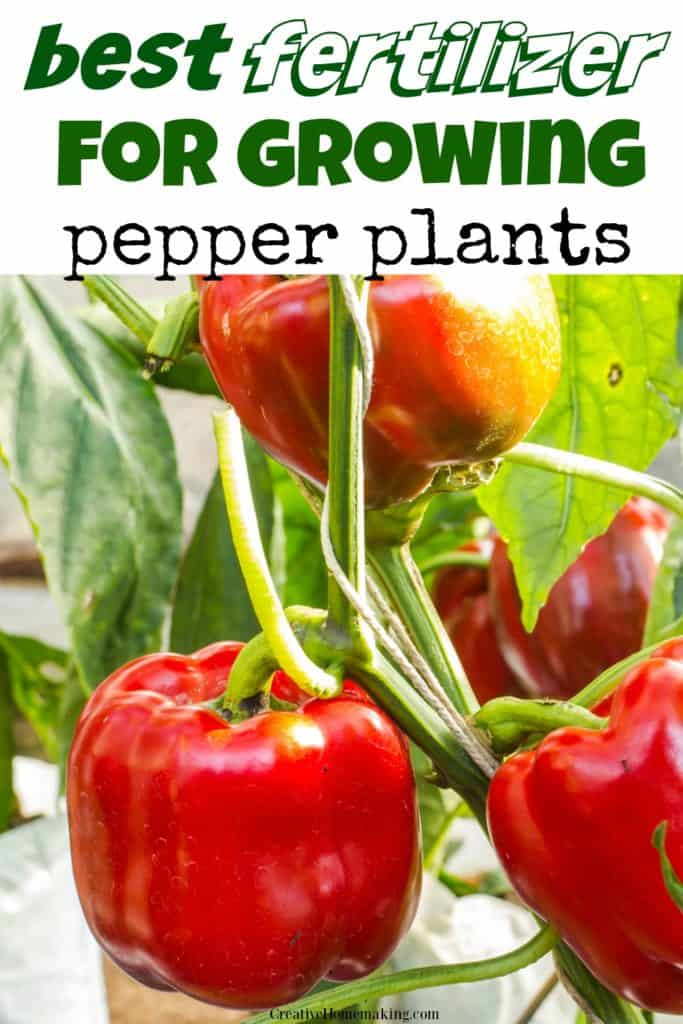Discover the Best Fertilizers for Peppers and Enhance Your Yard's Yield
Discover the Best Fertilizers for Peppers and Enhance Your Yard's Yield
Blog Article
Organic Vs. Synthetic Fertilizers: Which Is Best for Nurturing Healthy And Balanced Pepper Plants?
In the world of supporting healthy and balanced pepper plants, the selection between organic and artificial plant foods stands as a critical choice with far-reaching ramifications. While both choices goal to provide necessary nutrients to sustain plant development, the nuances of their impact on the dirt, plant health and wellness, and the environment spark a discussion that mirrors throughout the gardening neighborhood. Understanding the distinctive advantages and possible risks of each plant food kind is important for pepper growers looking for to enhance their returns while maintaining a sustainable and eco-conscious strategy.
Benefits of Organic Plant Foods
Organic fertilizers use an environmentally-friendly and lasting method to beneficial pepper plants, providing necessary nutrients without the usage of synthetic chemicals. These all-natural fertilizers are stemmed from natural resources such as compost, manure, bone dish, and algae, promoting soil health and wellness and biodiversity. Unlike artificial plant foods, organic options launch nutrients slowly, guaranteeing a steady and well balanced supply for pepper plants to flourish.
One significant benefit of natural fertilizers is their capability to boost soil structure and water retention. By boosting dirt health and wellness, natural fertilizers promote valuable microbial activity, which assists in nutrient uptake by pepper plants. Furthermore, organic plant foods minimize the danger of chemical run-off, protecting water resources from pollution and securing the atmosphere.
Additionally, natural fertilizers contribute to long-lasting soil fertility by advertising the growth of helpful dirt organisms. These microorganisms aid break down organic matter, releasing nutrients in a form that is conveniently available to pepper plants. best fertilizers for peppers. By fostering a healthy and balanced dirt environment, natural plant foods support sustainable pepper growing practices that profit both plants and the environment
Disadvantages of Artificial Fertilizers
Synthetic plant foods, in contrast to their natural counterparts, pose various downsides when used to nourish pepper plants, influencing both plant health and wellness and ecological sustainability. One significant drawback of artificial fertilizers is their tendency to leach nutrients from the dirt promptly.
Additionally, the overuse of artificial fertilizers can add to water air pollution. Excess plant foods not absorbed by plants can remove right into water bodies, bring about eutrophication, where algae blooms deplete oxygen levels in the water, damaging marine life. Synthetic plant foods are typically obtained from non-renewable resources, such as fossil fuels, adding to carbon exhausts and environmental deterioration throughout their manufacturing.
Nutrient Absorption Contrast
Effective nutrient absorption plays an important role in the overall wellness and development of pepper plants. When comparing synthetic and organic fertilizers in regards to nutrient absorption, organic plant foods have the advantage of offering a much more balanced and slow-release resource of nutrients (best fertilizers for peppers). Organic fertilizers consist of a range of my explanation macro and trace elements that are not just beneficial for the plants however likewise promote healthy and balanced dirt microbial task, which assists in nutrient uptake. On the other hand, synthetic plant foods often offer a fast launch of nutrients, which can result in leaching and overflow, resulting in reduced nutrient absorption prices by the plants.
In addition, natural fertilizers boost soil structure and water retention capability, permitting pepper plants to accessibility nutrients much more efficiently. This better dirt high quality promotes root development, making it possible for better nutrient absorption. Artificial plant foods, although initially improving plant growth because of their high nutrient focus, may prevent long-term nutrient absorption by degrading soil wellness in time.
Environmental Effect Considerations

On the various other hand, synthetic fertilizers, although often more focused and promptly available to plants, can have detrimental impacts on the atmosphere if not used properly (best fertilizers for peppers). Their production needs high energy inputs, leading to greenhouse gas discharges and contributing to climate modification. The overflow of excess artificial plant foods can pollute water resources, leading to eutrophication and damaging marine environments.
Finest Fertilizer Practices for Peppers
To accomplish this, it is necessary to comply with ideal plant food methods tailored to the specific demands of pepper plants. One vital technique is to do a soil test before using any type of fertilizers.
One more vital technique is to feed pepper plants at the ideal time. Typically, peppers take advantage of receiving plant food at growing and then again when they begin to blossom. Over-fertilizing can lead to nutrient inequalities and damage the plants, so it is crucial to comply with advised application rates.
In addition, choosing a balanced fertilizer with an NPK ratio that fits pepper plants' demands is essential. Organic my review here plant foods, such as compost or manure, can be outstanding selections as they release nutrients slowly and improve dirt framework in time. Synthetic fertilizers can supply a quick nutrient boost when required. Eventually, combining natural and artificial plant foods deliberately can aid support healthy pepper plants while minimizing ecological impact.
Conclusion

Organic fertilizers use a sustainable and environmentally-friendly technique to beneficial pepper plants, providing essential nutrients without the use of artificial chemicals. Unlike artificial plant foods, organic choices launch nutrients gradually, guaranteeing a constant and well balanced supply for pepper plants to prosper.
Artificial fertilizers, in comparison to their organic equivalents, posture check my site various disadvantages when made use of to nurture pepper plants, affecting both plant wellness and environmental sustainability. When comparing natural and synthetic plant foods in terms of nutrient absorption, organic fertilizers have the benefit of supplying a more well balanced and slow-release resource of nutrients.Additionally, organic plant foods boost soil structure and water retention capability, enabling pepper plants to gain access to nutrients more effectively.
Report this page